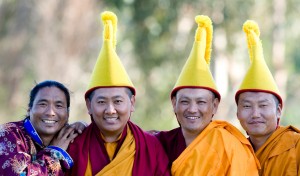 Tashi Lhunpo was founded by H.H. the 1st Dalai Lama, Gyalwa Gendun Drup, in 1447. It is one of the four great monasteries of Central Tibet which was supervised and looked after by the Dalai Lamas and Panchen Lamas and has the glory of producing thousands of renowned scholars in the field of Mahayana Buddhist Philosophy. After the invasion of Tibet in 1959, Tashi Lhunpo Monastery was re-established at Bylakuppe in South India in 1972. The monastery has monks coming from Tibet and Himalayan regions like Spithi, Khunu, Ladakh, Ghashar and Sangkhar. At present there are over 250 monks including many Tulkus (reincarnate lamas). The monks have to go through year intensive program of study of both sutra and tantra, debate, and are instructed in the creation of sand mandalas and butter sculpture, ritual performance, music, chanting, dance and basic literary skills in Tibetan and English. Each monk must also complete a two to three month meditation retreat for each of the principal deities and protectors, in order to qualify to perform their rituals. The cycle of retreats might take up to six years to complete.
Tashi Lhunpo was founded by H.H. the 1st Dalai Lama, Gyalwa Gendun Drup, in 1447. It is one of the four great monasteries of Central Tibet which was supervised and looked after by the Dalai Lamas and Panchen Lamas and has the glory of producing thousands of renowned scholars in the field of Mahayana Buddhist Philosophy. After the invasion of Tibet in 1959, Tashi Lhunpo Monastery was re-established at Bylakuppe in South India in 1972. The monastery has monks coming from Tibet and Himalayan regions like Spithi, Khunu, Ladakh, Ghashar and Sangkhar. At present there are over 250 monks including many Tulkus (reincarnate lamas). The monks have to go through year intensive program of study of both sutra and tantra, debate, and are instructed in the creation of sand mandalas and butter sculpture, ritual performance, music, chanting, dance and basic literary skills in Tibetan and English. Each monk must also complete a two to three month meditation retreat for each of the principal deities and protectors, in order to qualify to perform their rituals. The cycle of retreats might take up to six years to complete.
Tashi Lhunpo Monks
Tashi Lhunpo Monks Of TIBET
RANGZEN: for TIBET with Love Concert
In a journey into the world of Tibetan chants and ritual dances, the Monks of Tibet perform sacred rituals which embody the essence of secret tantric teachings. Tenzin Choegyal draws on his traditional Tibetan roots to create original and authentic musical compositions which uniquely express his cultural heritage. The Roaring Fire Choir of 50 voices with Tenzin, led by renowned musical director, Yani, presents an inspiring performance to complete a magical and moving evening of music.
Visy Theatre Fri 3rd Feb 8pm $30 ($25con)  Phone Box Office (07) 3358 8600 or click![]()
The TIBET Effect
 Be the first audience ever to experience the new collaborative work, The Tibet Effect, featuring Indian based Tibetan poet, author and activist, Tenzin Tsundue, the Tashi Lhunpo Monks, Katherine Philp (cello), Shen Flindell (tabla), Peter Hunt (trumpet) and Tenzin Choegyal (dranyen, flute, vocals). Through poetry, narrative, music and chant, The Tibet Effect opens a door to the Tibetan refugee experience, the hopes, fears and dreams of those who long for justice. Enlightening and often amusing, The Tibet Effect will certainly create ripples within all who witness it.
Be the first audience ever to experience the new collaborative work, The Tibet Effect, featuring Indian based Tibetan poet, author and activist, Tenzin Tsundue, the Tashi Lhunpo Monks, Katherine Philp (cello), Shen Flindell (tabla), Peter Hunt (trumpet) and Tenzin Choegyal (dranyen, flute, vocals). Through poetry, narrative, music and chant, The Tibet Effect opens a door to the Tibetan refugee experience, the hopes, fears and dreams of those who long for justice. Enlightening and often amusing, The Tibet Effect will certainly create ripples within all who witness it.
Tenzin Tsundue is an award winning author, poet and activist who resides in Dharamsala, India. Named by the Indian edition of the fashion magazine Elle as one of India’s 50 ‘most stylish people of 2002’. He has published three books, his writings winning the Outlook-Picador Award for Non-Fiction in 2001. The charismatic Tenzin Tsundue has been wearing his red headband for eight years and pledges not to remove it until Tibet is free.
Visy Theatre Sat 4th Feb 8pm $30 ($25con)  Phone Box Office (07) 3358 8600 or click![]()
Tibetan Ritual Dance Workshop
Cham or sacred dance is a feature of many Tibetan festivals. This ancient dance possesses many levels of meaning and is seen as a practice for purification and overcoming negative obstacles. It is said the great religious master Padmasambhava first performed the dance to purify the ground for the building of Samye monastery. Accompanied by monks using traditional Tibetan instruments, the Cham dancer performs solemn movements passed on in oral instruction from master to student.The dance is like a “meditation in action”. Each gesture has significance, creating a sacred space where the dancer concentrates on specific centers and chakras throughout the performance.
Mantra Healing Workshop
Mantras are energy-based sounds, which produce vibrations in the Universe. “Mantra” is derived from two Sanskrit words. Man for Mind and Tra for “to protect or to free fromâ€. Saying any word produces an actual physical vibration. When we know what the effect of that vibration is, then the word may come to have meaning associated with the effect of saying that vibration or word.
Sand Mandala Workshop
Participants in these workshops learn about the meaning and history of the sand mandala. The Tashi Lhunpo Monks will share their knowledge of the traditional techniques using the small metal funnel known as the chak phur to create designs with coloured sand, allowing everyone to experience the beauty and challenges of the art form.
Healing Mantra Concert 2010
 The Healing Mantra Concert brings together The Australian Voices, Tashi Lhunpo Monks of TIBET and Tibetan musician, Tenzin Choegyal in a concert that will include singing Mantras to create thought energy waves, bring peace to the mind through self realization and connect us to our subconscious mind.
The Healing Mantra Concert brings together The Australian Voices, Tashi Lhunpo Monks of TIBET and Tibetan musician, Tenzin Choegyal in a concert that will include singing Mantras to create thought energy waves, bring peace to the mind through self realization and connect us to our subconscious mind.
The Australian Voices is a national group of highly awarded young singers who have toured the globe to represent the spirit of Australian music alongside some of the world’s great musicians such as Jose Carreras, Bobby McFerrin (“Don’t Worry, Be Happyâ€) and Evelyn Glennie. Tashi Lhunpo Monks will join this concert
Mystical Tibet Concert 2010
 Mystical Tibet Concert brings rarely seen sacred dances and chants of The Tashi Lhunpo Monks of TIBET and evocative and haunting musical collaboration of Brisbane’s string chamber orchestra, Camerata of St John’s and Tibetan musician, Tenzin Choegyal.
Mystical Tibet Concert brings rarely seen sacred dances and chants of The Tashi Lhunpo Monks of TIBET and evocative and haunting musical collaboration of Brisbane’s string chamber orchestra, Camerata of St John’s and Tibetan musician, Tenzin Choegyal.
Camerata of St John’s a group of talented, professional Australian string players. Performing without a conductor, Camerata is known for its verve, stylish presentations, and innovative programming. Acclaimed performances provide enduring and treasured memories for its dedicated audience, players and guest artists. From its home in the heart of the emerging cultural city of Brisbane, Camerata adds a refreshing perspective to the nation’s artistic life.
Tenzin Choegyal‘s voice and musical talents are unique and mesmerizing. Tenzin draws on his traditional Tibetan roots to create original compositions which express his devotion to his cultural heritage. Recently at a US concert, a listener described hearing Tenzin Choegyal sing live as ‘heaven on earth’. His voice and music however are only part of his story. Tenzin was born in Tibet, escaped to Nepal and was raised in exile in Dharamsala, India. As a child, Tenzin would listen to his mother singing in the nomadic style of Tibet and he attributes much of his passion for that genre to her early influence.
